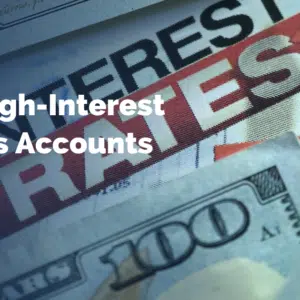To get the best savings account rates, start by shopping around and comparing different banks and credit unions. Here are some of the top national rates to get the most out of your savings account.
While the best savings accounts used to come from traditional brick-and-mortar institutions, this is no longer the case at all. The reality is that many online banks and fintech companies offer savings accounts with lower fees (or no fees) these days, and their interest rates are much more competitive than you’ll find elsewhere.
Don’t believe me? Once you do some digging, you’ll quickly find that banks like Chase and Wells Fargo are offering a paltry 0.15% rate on their regular savings accounts. This is even lower than the national average the FDIC is reporting!
Since you definitely want to secure the highest rates you can on your savings, it’s crucial to compare banks and their savings account offers side-by-side. We just did exactly that to help you in your search, and we highlight the best savings accounts of 2024 below.
Our Picks for Best Savings Accounts of July 2024
- Discover Online Savings Account: Best User Experience
- UFB Direct Rewards Savings: Best for High APY
- CIT Bank Savings Connect: Best for No Fees
- Marcus by Goldman Sachs: Best for No Minimum Deposit
- Citi Accelerate Savings: Best for Citi Customers
- Barclays Online Savings Account: Best Online Tools
- SoFi Money: Best Sign-Up Bonus Offer
- Bread High Yield Savings: Best for Easy Online Transfers
Best Savings Accounts – Reviews
Table of Contents
Before you open up one of the best savings accounts we profile in this guide, you should get a general idea of how each account works, including their minimum account balance requirements and monthly fees. The following savings account reviews can help you learn more about each bank and what they offer.
| Current APY | Minimum Deposit Amount | Fees |
| 4.25% | $0 | None |
While Discover® is well known for its popular rewards credit cards, this online bank also offers personal loans, checking and savings accounts, and student loans. When it comes to their savings account products, consumers can open an account with a $0 minimum deposit requirement and no monthly fees or maintenance fees.
You can open an online savings account with Discover without having to visit a physical bank branch, and your Discover account may come with broad ATM access, depending on where you live.
Other benefits of Discover online savings accounts include no fees for insufficient funds and access to a highly-rated mobile app that makes it easy to make deposits, monitor your account balance, or transfer money between accounts on the go.
| Current APY | Minimum Deposit Amount | Fees |
| 5.25% | $0 | None |
UFB Direct offers a high-yield savings account with no maintenance or service fees and no minimum account balance required. You don’t have to make a minimum direct deposit of any kind to qualify for their highest-yield offer, and you even get a free ATM card included.
UFB Direct also comes with a robust online banking portal, as well as a mobile app that is highly rated by users. You can use the app to make mobile deposits, track your spending and savings goals, and transfer money between accounts. This bank also comes with 128-bit encryption on their accounts, so you can rest assured your banking information and personal data will remain safe.
| Current APY | Minimum Deposit Amount | Fees |
| 4.65% | $100 | None |
While CIT Bank was once a standalone online bank, the institution is now a division of First Citizens Bank. With that in mind, you should know that the CIT Bank Savings Connect account requires a minimum deposit of at least $100 to get started. However, there are no account management fees or hidden fees to be aware of, and consumers can earn an exceptional rate of 4.65% APY.
Opening this account online is a breeze, and consumers can use the mobile app to make deposits remotely, transfer money, or keep track of their savings balance. Like other savings accounts that made our ranking, CIT Bank is also FDIC-insured. This means that depositors can sleep well at night knowing that up to $250,000 of their savings has protection in the event of a bank default.
| Current APY | Minimum Deposit Amount | Fees |
| 4.15% | $0 | None |
Marcus by Goldman Sachs offers some of the best high-yield savings accounts and personal loans on the market today. Their savings accounts, in particular, offer a competitive APY of 4.30%. There are no fees required for this account, and you can open one and get started with no minimum deposit required.
You can also make same-day transfers from other banks in amounts up to $100,000, and Marcus by Goldman Sachs accounts are all FDIC insured.
The bank’s mobile app is also highly rated and recommended. Applicants can open their accounts online or using the mobile app, but the app itself is incredibly useful once you fund your account. As an example, you can use the Marcus by Goldman Sachs app to schedule transfers in and out of your account, see how much interest you have earned, and keep track of your savings goals.
| Current APY | Minimum Deposit Amount | Fees |
| 4.05% | $0 | $4.50 monthly service fee if you maintain a balance of less than $500 |
If you are hoping to open a savings account with a bank that may have physical branches in your area, Citibank is worth considering. This bank has branches throughout the country, but you’ll also be able to access over 65,000 ATMs through their network. In the meantime, Citibank also offers a useful mobile app with excellent ratings on Google Play and in the App Store.
In terms of their online savings account, their highest tier of savings currently earns 4.05% APY. A monthly service fee of $4.50 may apply if you have a Citi Accelerate savings account without a connected checking account, but you can have this fee waived if you maintain an average monthly balance of at least $500 in your account at all times.
| Current APY | Minimum Deposit Amount | Fees |
| 4.35% | $0 | None |
Barclays is another bank that offers exceptional high-yield savings account almost anyone can open. This account is currently earning 4.35% APY, and the minimum account balance requirement starts at $0. There are also no monthly fees associated with this account, as well as no hidden fees in general.
Barclays accounts come with FDIC insurance, and they make it easy to transfer money between accounts online or using the bank’s mobile app. At the end of the day, this account is a no-frills option that aims to grow your savings without requiring you to jump through any hoops.
| Current APY | Minimum Deposit Amount | Fees |
| 4.6% APY | $0 | None |
SoFi offers an exceptional APY of 4.6% on their savings accounts with no minimum deposit requirement and no monthly fees or hidden fees to worry about. The online bank is even offering a new account bonus of up to $300 when you sign up and set up qualifying direct deposits to your account.
Opening an account with SoFi also gets you access to more than 55,000 fee-free ATMS in the Allpoint ATM network, and qualifying direct deposits can protect you from overdraft fees when you overdraft your account by up to $50. A SoFi savings account also lets you access your paycheck up to two days early. The SoFi mobile app is highly rated as well, and it makes it easy to monitor all your SoFi accounts in one place.
Bread Savings is another online institution that can help you grow your savings with a high APY and no hidden fees. You need at least $100 to open a savings account with Bread, and you can earn an APY of 4.75% after that, regardless of your account balance.
Bread’s high-yield savings accounts are mostly free of frills and special features, but the company does have a mobile app with plenty of perks. For example, you can use the Bread app to monitor your savings balance, transfer funds, make deposits, and more. Bread also offers unlimited deposits via mobile check capture and ACH transfer.
Finding the Best Savings Accounts
Opening a savings account can make it easier to reach your savings goals, yet it can make sense to check out and compare other financial products like Certificates of Deposit (CDs) and money market accounts as well. If you want an account that you can use to make regular purchases, you should also look at the best checking accounts on the market today.
When evaluating the best savings accounts, here are all the factors you need to consider:
| Factor | Description | Pros | Cons |
|---|---|---|---|
| Interest Rate | The percentage rate that the bank pays you on your savings | Higher rates earn you more interest income over time | Rates can change frequently and may be subject to limitations or fees |
| Fees | Charges by the bank for account maintenance, transactions, or other services | Low or no fees help you keep more of your savings | Some fees may be unavoidable, such as those for overdrafts or account closures |
| Minimum Balance | The minimum amount required to keep in the account to avoid fees or earn interest | Low or no minimum balances make it easier to keep your account open | Higher minimum balances may be required for higher interest rates or other benefits |
| Access to Funds | How easily and quickly you can withdraw your money | Easy access can be helpful in emergencies or for unexpected expenses | Restrictions on withdrawals may limit your flexibility |
| Account Features | Additional benefits or services, such as online banking, mobile apps, or ATM access | Convenient features can make managing your account easier and more efficient | Additional features may come with additional fees or restrictions |
| FDIC Insurance | The Federal Deposit Insurance Corporation (FDIC) insures bank deposits up to $250,000 | FDIC insurance provides peace of mind that your savings are protected | Accounts at banks that aren’t FDIC-insured may not be as secure |
Savings Accounts 101
If you still believe the best savings accounts will meet your needs, read on to learn more about how savings accounts work and their pros and cons.
How Savings Accounts Work
A savings account is a type of bank account that intends to help you grow your money over time. Savings accounts offer an annual percentage yield (APY) that is a lot higher than you’ll get with a checking account. However, some savings accounts come with minimum balance requirements, monthly fees, or limits on the amounts you can transfer or withdraw each month.
To get the most out of a savings account, you should look for options that offer the highest APY you can find with minimal fees or no fees. You can grow your savings faster by setting up automatic transfers or deposits, and you can open multiple savings accounts for different goals.
Use-Cases for Savings Accounts
There are myriad reasons to open a savings account with your regular bank or an online institution. With that in mind, here are some of the most common uses for savings accounts and the funds they hold.
- Short-Term Goals: Many consumers use a savings account to save up for short-term goals, whether that includes home upgrades or repairs, an upcoming vacation, or a new vehicle for the family.
- Long-Term Goals: You can also use a savings account to save for longer-term goals such as the down payment on a home, college tuition, or your future retirement.
- Emergency Funds: Most experts say you should have three to six months of expenses tucked away in a savings account for emergencies only. With a fully-stocked emergency fund that’s held in a high-yield savings account, you’ll have some protection against unexpected expenses and bills, a loss in income, a job loss, and more.
- Rainy Day Funds: It never hurts to have some savings that aren’t allocated for anything in particular. You can open up a savings account and fund it for anything that pops up, from a last-minute trip you want to take to a splurge purchase of something you have always wanted.
How We Found the Best Savings Accounts
To find the best savings accounts on the market today, we looked for options that offer the highest annual percentage yield (APY) possible with no monthly fees or minimal fees required. We also looked for institutions that have a mobile app, and we only considered bank accounts that are FDIC-insured.
Other features we looked for include low minimum deposit requirements (or a $0 minimum deposit requirement), access to fee-free ATMS, a robust online portal, and easy money transfers and deposits via an online banking portal or mobile app.
- Discover Online Savings Account: Best User Experience
- UFB Direct Rewards Savings: Best for High APY
- CIT Bank Savings Connect: Best for No Fees
- Marcus by Goldman Sachs: Best for No Minimum Deposit
- Citi Accelerate Savings: Best for Citi Customers
- Barclays Online Savings Account: Best Online Tools
- SoFi Money: Best Sign-Up Bonus Offer
- Bread High Yield Savings: Best for Easy Online Transfers
The Bottom Line – Finding the Best Savings Account Rates
Shopping around for online savings accounts can be intimidating at first, but with the right research tools and a bit of savvy, you can find the perfect fit for your needs. Make sure to remember the importance of security when evaluating online accounts and, of course, look for the one with the best rate of return.
People often overlook online savings as a way to make their money work for them – don’t forget that a high-yield account often starts from small beginnings! Take advantage of online savings options and unlock a wealth of financial opportunities.
FAQs on Finding the Best Savings Account For Your Money
The best online savings accounts offer the highest interest rates with low fees or no fees at all. Based on our research, we believe that the best savings account options of 2024 come from Discover, CIT Bank, Marcus by Goldman Sachs, Citibank, Barclays, SoFI, and a fintech company called Bread.
The best savings account rate varies depending on market conditions and the individual institution’s rates. Generally, a rate of 3.0% or higher is considered a good rate for a savings account, but it’s important to remember that rates can change over time.
Some savings accounts may offer higher rates for larger deposits or for customers who maintain a higher balance in their accounts. Be sure to check the account terms and conditions to see if this applies to the account you’re considering.
Savings account rates can change frequently, depending on market conditions and the policies of the individual financial institution. It’s important to keep an eye on your account rate and compare rates regularly to ensure you’re getting the best rate available.
Savings account rates are not guaranteed and can change over time. The rate you earn on your savings account is subject to change based on market conditions and the policies of the individual financial institution.
APY stands for annual percentage yield. The APY is used to show the real rate of return earned in your savings account after taking the magic of compound interest into account.








Why is Marcus best for no minimum deposit when UFB also has no minimum deposit?